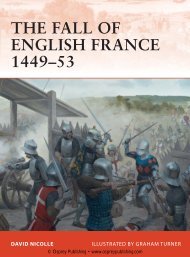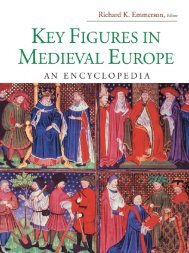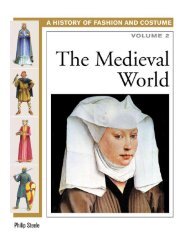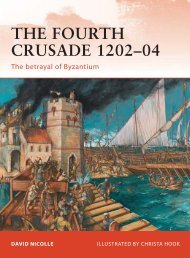Osprey - General Military - Knight - The Warrior and ... - Brego-weard
Osprey - General Military - Knight - The Warrior and ... - Brego-weard
Osprey - General Military - Knight - The Warrior and ... - Brego-weard
Create successful ePaper yourself
Turn your PDF publications into a flip-book with our unique Google optimized e-Paper software.
hen the theologians Augustine of Hippo<br />
<strong>and</strong> Thomas Aquinas set out the terms<br />
by which war was acceptable to the<br />
Church they set clear restrictions on who was able<br />
to participate. Clerics, who by their vocation were<br />
sacred, were forbidden to spill blood, as were<br />
members of monastic orders, whose communities<br />
prefigured the Kingdom of Heaven <strong>and</strong> who should<br />
abstain from war as they abstained from possessions<br />
or marriage.<br />
This did not preclude the involvement of the<br />
clergy in warfare altogether, however. Priests<br />
routinely accompanied armies, in part to serve the<br />
normal daily spiritual needs of the warriors.<br />
Confession, penance <strong>and</strong> the Mass took on an extra<br />
significance in the face of battle. As battle was<br />
engaged those priests would gather <strong>and</strong> pray for<br />
victory, as well as being there to tend the wounded<br />
<strong>and</strong> offer the last rites. As previously mentioned, at<br />
the battle of Northallerton, also known as the Battle<br />
of the St<strong>and</strong>ard for the saint's banners that the Anglo-<br />
Norman forces carried with them, the priests,<br />
including Bishop Ralph of the Orkneys, stood on a<br />
hill above the battle, praying for God's intercession<br />
against the Scots.<br />
Priests might also take a more active role. <strong>The</strong><br />
communal militias that the Church encouraged for<br />
the enforcement of the Peace <strong>and</strong> Truce of God<br />
were often led by parish priests who, as men of local<br />
st<strong>and</strong>ing <strong>and</strong> the representatives of the Church,<br />
were obvious choices for comm<strong>and</strong>. Senior<br />
churchmen combined the role of secular <strong>and</strong><br />
ecclesiastical lord. In the Holy Roman Empire (an<br />
elected monarchy spanning almost all of modern<br />
Germany <strong>and</strong> Austria <strong>and</strong> parts of Belgium <strong>and</strong><br />
Holl<strong>and</strong>) the prince-bishops fused both secular <strong>and</strong><br />
ecclesiastical power in one body. <strong>The</strong> Bishop of<br />
Durham had similar powers within his diocese<br />
which, given its proximity to the Scottish border,<br />
was a major military zone. It was inevitable that he<br />
later medieval conceptions of the limits ol war. He recognized that peace was<br />
impossible on earth <strong>and</strong> that it was necessary to make a place lor war within<br />
Christianity. To his thinking wars were acceptable if they were 'just'. 'Just war',<br />
according to Augustine, was primarily the fight for justice <strong>and</strong> the tranquillity of order.<br />
War to right wrongs <strong>and</strong> recover goods was just', even if one was the aggressor.<br />
However just war' should be declared <strong>and</strong> waged on the authority of a prince.<br />
He alone held the responsibility for taking up arms. I f he declared a war that was not<br />
|ust then the sin was his, his soldiers were rendered innocent by their duty to obey their<br />
lord. Augustine also instructed that those with a religious calling should not participate<br />
in war. <strong>The</strong>ir sacred nature prohibited monks <strong>and</strong> clerics from spilling blood.<br />
Augustine believed that 'jiL.ita bella ulcutcuntur injuria^', that is that just wars avenge<br />
injuries'. <strong>The</strong> prince who waged a just war' acted as the instrument of God's







